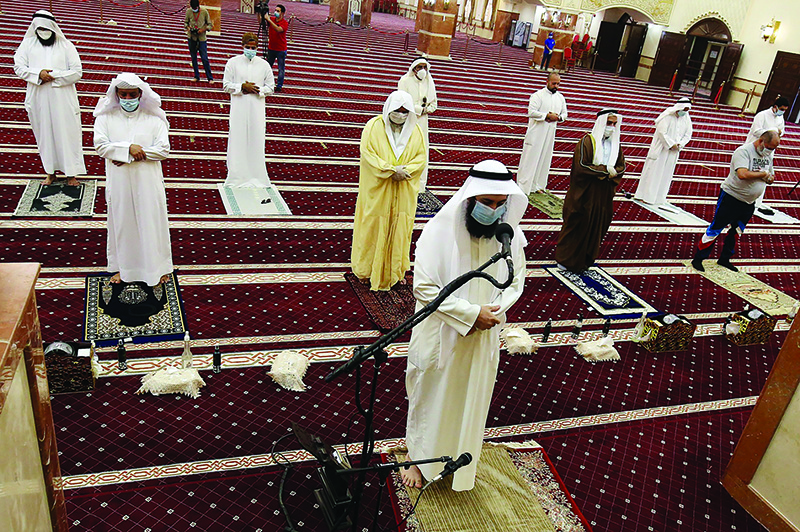
By B Izzak
KUWAIT: Mosques in so-called modern residential areas reopened their doors to worshippers for the first time following three months of unprecedented closure due to the coronavirus outbreak. To celebrate the occasion, Islamic charity organizations slaughtered 100 sheep and distributed the meat to the needy. Minister of Justice and Islamic Affairs Mohammad Al-Afasi said mosques in commercial, market and heavily-populated areas will remain closed for the time being.
Mosques opened for Dhuhr (noon) prayers amid strict health precautionary measures. Worshippers must wear facemasks and social distancing between rows and worshippers must be strictly observed. Worshippers must bring their own mats so they do not come in contact with mosque carpets.
Mosques will open five minutes before prayer time and close 10 minutes after prayers. In the first phase, no Friday prayer will be held except at the Grand Mosque in Kuwait City. The ministry of Islamic Affairs asked the defense ministry to sanitize all mosques before they are reopened.
The National Assembly’s legal and legislative committee yesterday sought the opinion of the justice ministry and the Supreme Judicial Council about proposals on how to deal with payment of rent during the coronavirus crisis, head of the committee said. MP Khaled Al-Shatti said the committee discussed a number of proposals and found there are different opinions from the landlords and representatives of businesses affected by the virus.
Shatti said that the panel had previously settled the issue of residential rent by proposing a provision that prevents landlords from evicting tenants during the crisis if they fail to pay rent on time. The provision however does not propose any reduction in residential rent.
The landlords union meanwhile rejected any reduction in residential rent because tenants have been using the leased real estate, but offered a 50 percent cut to commercial shops for up to three months because tenants were prevented from using their shops due to shutdowns.
Residential tenants have been calling for some reduction in rent because many of them have either lost jobs or had their salaries reduced because of the coronavirus crisis, rendering them unable to pay rent. Some landlords have volunteered to cut rent by more than 30 percent.
MPs have filed draft laws calling to suspend the payment of rent for commercial uses throughout the shutdowns ordered by the government, while one bill calls for exempting commercial tenants for six months.
Meanwhile, a parliamentary committee in charge of developing human resources will hold two days of meetings with various government bodies to discuss ways to improve the population structure currently tilted in favor of expats. The committee will meet with representatives of the Public Authority for Manpower, Supreme Planning Council and the Central Statistics Bureau, in addition to the interior ministry to discuss draft laws submitted by MPs related to the population structure.
MPs have submitted at least two draft laws in the past few weeks calling to replace all expat employees in the government and for imposing quotas on expat communities in the country. MP Mohammad Hayef meanwhile said he submitted a draft law to appoint more Kuwaitis as judges to replace a large number of Arab judges, mostly from Egypt. The draft law sets guidelines for Kuwaitis eligible to apply to become judges.










